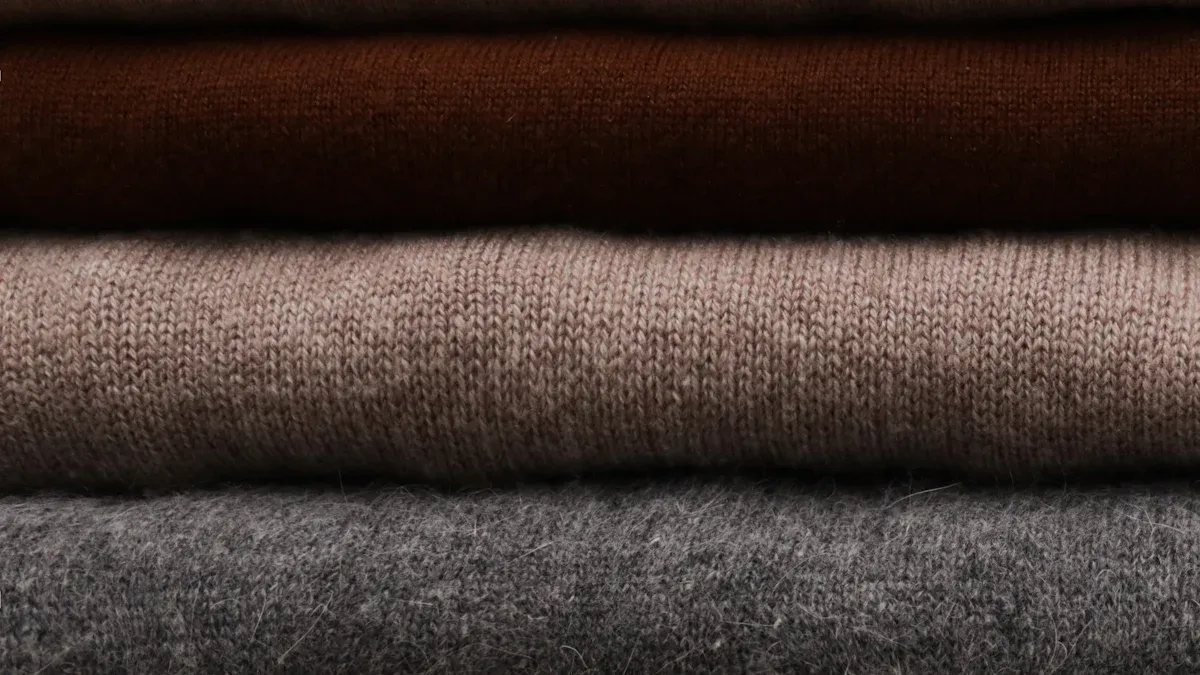
A T-Shirt Sourcing Calculator helps you make informed decisions when sourcing. It allows you to estimate fabric weight and logistics costs accurately. Knowing these factors is crucial. They can significantly impact your overall expenses and product quality.
Key Takeaways
- Understanding fabric weight is crucial for T-Shirt quality. Choose the right GSM based on the intended use to ensure comfort and durability.
- Accurate logistics cost estimation helps you budget effectively. Consider transportation, packaging, and customs fees to avoid unexpected expenses.
- Using a T-Shirt Sourcing Calculator streamlines your sourcing process. Input precise data to receive accurate estimates for fabric weight and logistics costs.
Understanding Fabric Weight

Fabric weight refers to the heaviness of the material used in making T-Shirts. It plays a crucial role in determining the quality, durability, and comfort of the final product. Understanding fabric weight helps you make better sourcing decisions. Here are some key points to consider:
- Measurement Units: Fabric weight is typically measured in grams per square meter (GSM). This unit indicates how much one square meter of fabric weighs. A higher GSM usually means a thicker and heavier fabric.
- Types of Fabric: Different fabrics have varying weights. For example:
- Cotton: Commonly used for T-Shirts, cotton fabric can range from lightweight (around 120 GSM) to heavyweight (over 200 GSM).
- Polyester: This synthetic fabric often weighs less than cotton, making it suitable for lightweight T-Shirts.
- Impact on Quality: The weight of the fabric affects the overall quality of the T-Shirt. Heavier fabrics tend to be more durable and provide better drape. Lighter fabrics may feel softer but can wear out faster.
Tip: When choosing fabric weight, consider the intended use of the T-Shirt. For casual wear, lighter fabrics may be ideal. For workwear or promotional items, heavier fabrics offer better longevity.
- Comfort and Fit: Fabric weight also influences how a T-Shirt fits and feels on the body. Heavier fabrics may feel more structured, while lighter fabrics can provide a relaxed fit.
Calculating Fabric Weight
Fabric GSM and Its Impact
Fabric weight is often measured in grams per square meter (GSM). This measurement helps you understand how heavy or light a fabric is. The GSM value directly affects the quality and feel of your T-Shirt. Here’s how:
- Lightweight Fabrics: Fabrics with a GSM below 150 are considered lightweight. They are soft and breathable, making them perfect for casual wear. However, they may not last as long.
- Medium Weight Fabrics: Fabrics with a GSM between 150 and 200 offer a balance of comfort and durability. These fabrics work well for everyday T-Shirts.
- Heavyweight Fabrics: Fabrics with a GSM above 200 are heavyweight. They provide excellent durability and structure. These fabrics are ideal for workwear or promotional items.
Tip: Always consider the intended use of your T-Shirt when choosing fabric weight. A lightweight fabric may be great for summer, while a heavyweight fabric is better for cooler weather.
Step-by-Step Calculation Process
Calculating fabric weight is straightforward. Follow these steps to determine the GSM of your fabric:
- Measure the Area: Determine the size of the fabric piece in square meters. For example, a T-Shirt typically uses about 1.5 square meters of fabric.
- Weigh the Fabric: Use a scale to weigh the fabric in grams.
- Calculate GSM: Use the formula:
[
\text{GSM} = \frac{\text{Weight of Fabric (grams)}}{\text{Area (square meters)}}
]
For instance, if your fabric weighs 300 grams and covers 1.5 square meters, the calculation would be:
[
\text{GSM} = \frac{300}{1.5} = 200 \text{ GSM}
]
By following these steps, you can accurately determine the fabric weight for your T-Shirts.
Logistics Cost Estimation

When you source T-Shirts, understanding logistics costs is essential. These costs can significantly affect your overall budget. You need to consider various components that contribute to logistics expenses.
Components of Logistics Costs
Logistics costs consist of several key components. Each component plays a role in determining the total cost of getting your T-Shirts from the manufacturer to your location. Here are the main components to consider:
- Transportation Costs: This includes the expenses related to shipping your T-Shirts. You may choose different shipping methods, such as air, sea, or ground transport. Each method has its own cost structure.
- Packaging Costs: Proper packaging protects your T-Shirts during transit. You need to factor in the cost of boxes, tape, and other materials used for packaging.
- Customs Duties and Taxes: If you import T-Shirts from another country, you may incur customs duties and taxes. These fees vary based on the country of origin and the value of the goods.
- Insurance Costs: Insuring your shipment can provide peace of mind. If anything happens during transit, insurance can help cover losses.
- Warehousing Costs: If you need to store your T-Shirts before distribution, warehousing costs come into play. This includes rent for storage space and any handling fees.
Tip: Always calculate these components when estimating logistics costs. Understanding each part helps you make better financial decisions.
Using Shipping Calculators
Shipping calculators can simplify the process of estimating logistics costs. These tools allow you to input specific details about your shipment and receive accurate cost estimates. Here’s how to use them effectively:
- Input Shipment Details: Enter the weight and dimensions of your T-Shirts. Include the destination and shipping method.
- Compare Rates: Shipping calculators often provide rates from multiple carriers. This allows you to compare costs and choose the best option for your budget.
- Consider Delivery Times: While cost is important, delivery time matters too. Ensure you select a shipping option that meets your timeline.
- Review Additional Fees: Some calculators include additional fees, such as handling or fuel surcharges. Be sure to account for these in your total estimate.
Using shipping calculators can save you time and help you avoid unexpected costs. By understanding logistics costs and utilizing these tools, you can make informed decisions when sourcing T-Shirts.
Using the T-Shirt Sourcing Calculator
Inputting Data for Accurate Results
To get the most out of the T-Shirt Sourcing Calculator, you must input accurate data. Here’s how to do it effectively:
- Fabric Weight: Enter the GSM of your chosen fabric. This value determines the heaviness of the T-Shirt material.
- Quantity: Specify how many T-Shirts you plan to order. This number affects both fabric and logistics costs.
- Shipping Method: Choose your preferred shipping method. Options may include air, sea, or ground transport.
- Destination: Input the delivery location. Different regions may have varying shipping costs.
- Packaging Details: Include any packaging requirements. This can impact the overall logistics cost.
By providing precise information, you ensure that the calculator generates accurate estimates for your sourcing needs.
Example Calculations
Let’s look at an example to illustrate how the T-Shirt Sourcing Calculator works. Suppose you want to order 100 T-Shirts made from a fabric with a GSM of 180. You choose ground shipping to a location within the same country.
- Fabric Weight Calculation:
- Total fabric weight = 100 T-Shirts × 180 GSM = 18,000 grams (or 18 kg).
- Logistics Cost Estimation:
- If the shipping cost is $5 per kg, then:
- Total shipping cost = 18 kg × $5 = $90.
In this scenario, you can see how the calculator helps you estimate both fabric weight and logistics costs effectively.
Benefits of Accurate Sourcing
Cost Savings
Accurate sourcing can lead to significant cost savings for your T-Shirt business. Here are some ways it helps:
- Reduced Material Costs: By estimating fabric weight correctly, you avoid over-ordering. This means you only pay for what you need.
- Lower Shipping Expenses: Understanding logistics costs allows you to choose the most cost-effective shipping method. You can compare rates and select the best option.
- Minimized Waste: Accurate calculations help you reduce fabric waste. This not only saves money but also benefits the environment.
Tip: Always review your sourcing estimates. Small adjustments can lead to big savings over time.
Improved Decision Making
When you use a T-Shirt Sourcing Calculator, you enhance your decision-making process. Here’s how:
- Informed Choices: With accurate data on fabric weight and logistics costs, you can make better choices about materials and suppliers.
- Budget Management: Knowing your costs upfront helps you stick to your budget. You can allocate funds more effectively across your project.
- Quality Control: Understanding fabric weight impacts the quality of your T-Shirts. You can select materials that meet your quality standards.
Note: Better decisions lead to higher customer satisfaction. When you provide quality products, your customers are more likely to return.
By focusing on accurate sourcing, you not only save money but also improve your overall business strategy.
Using a T-Shirt Sourcing Calculator is essential for your sourcing strategy. It helps you accurately estimate fabric weight and logistics costs. This tool empowers you to make informed decisions.
Remember: Accurate sourcing leads to cost savings and improved product quality. Make the most of this calculator to enhance your T-Shirt business!
FAQ
What is the T-Shirt Sourcing Calculator?
The T-Shirt Sourcing Calculator helps you estimate fabric weight and logistics costs for your T-Shirt sourcing decisions.
How do I calculate fabric weight?
You calculate fabric weight by measuring the fabric area in square meters and weighing it in grams, then using the formula: GSM = Weight/Area.
Why is accurate logistics cost estimation important?
Accurate logistics cost estimation helps you budget effectively, choose the best shipping options, and avoid unexpected expenses during T-Shirt sourcing.
Post time: Sep-25-2025

